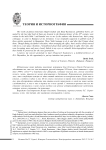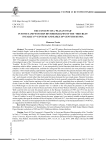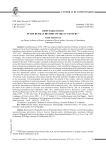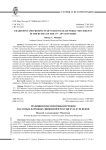Теория и историография. Рубрика в журнале - Вестник ВолГУ. Серия: История. Регионоведение. Международные отношения

Ivan the terrible: reform and reaction
Статья научная
Introduction. Hugh F. Graham (1925-1994) was a famous American historian, Professor at California State College (Bakersfield, USA), specialist in Greek and Latin sources for early Russian history, he also translated a number of R.G. Skrynnikov’s works into English. In this article, devoted to the epoch of Ivan IV the Terrible, H. Graham presented his view on the political processes that took place in the highest strata of the Moscow State that constituted the closest circle of Ivan IV the Terrible and that could influence the internal reforms and foreign policy in the state. Materials. The study is based on the works of Russian and foreign historians, which allowed the author of the article to show controversial issues and prepare the article using the problem approach (their names and titles of the works are specified in references). In addition, H. Graham drew attention to the data from the following published sources: the works of I. Peresvetov, Protestant pastor in Lithuania Pavel Oderborn, and others. Analysis. In this article, the author consistently outlined the events of the reign of Ivan IV: he paid attention to the reforms of the Elected Rada, the oprichnina, and the postoprichnina period. H. Graham noted that along with the active study of the oprichnina period by historians, the issue of functioning was missed, while Zemstvo acted in accordance with the former administrative and institutional norms, continued to function under the traditional aristocratic leadership of the princes I.F. Mstislavskii and I.D. Belskii, whom Ivan IV, in fact, called co-rulers, proclaiming: “We three hold all the power”. H. Graham did not agree with the view of the oprichnina as a struggle with the aristocratic circles. The historian saw the following paradox: almost all the victims were leading figures in the new world, and not advocates of the old order. They were responsible for developing management tools and served in key institutions, participating in the centralization process promotion. They helped the tsar to acquire more authoritarian power he so longed for. Results. It is the contention of this paper that the reign of Ivan the Terrible was not atypical, but simply a continuation in its own way of the regular path of development the Muscovite monarchy had long been following. However, a man still able to provoke such wildly disparate assessments of his character and accomplishments will continue to fascinate psychologists, bellettrists, historians, and popularizers alike. They will keep returning to him and hope that someone someday will at last manage to capture the elusive essence of the era and of the man himself in such a way as to win general acceptance. The abstract is prepared by Candidate of Sciences (History), Associate Professor N.V. Rybalko. The works of famous historians Hugh Graham and Knud Rasmussen, published below, are united by the fact that both of them are devoted to the Russian history of the 16th century, were written in the mid-1980s * and handed over to me by the authors who honored me, their young colleague, to come to Budapest at my invitation. I was originally supposed to publish each of these articles separately in Hungarian. Then I didn’t manage to do it, and after that I forgot about them. Though during my further relocation, when arranging the office, these articles always moved with me to a new place, therefore, I remembered about them and kept them in sight. Over time, they were becoming more and more clearly linked in my eyes as valuable historiographical sources that should be preserved for the next generations. I express my sincere gratitude to Igor Olegovich Tyumentsev, a faithful follower of R.G. Skrynnikov, for the opportunity to put my intention into practice. * Dating them is challenging because there are no dates of writing on the manuscripts with the exception of Hugh Graham’s work (see more about him: http://naukarus.com/hyu-grehem-indianskiy-eksperiment-i-sovetskoe-antikovedenie-50-60-h-godov). Knud Rasmussen (see more about him: http://novist.history.spbu.ru/trudy_kafedry/16_2_2016/2016_16_2_Vozgrin_V_E_-_Knud_Rasmussen_i_Hans_Bagger_datskie_istoriki_Rossii.pdf) probably gave me his article in 1984, when he came to Budapest shortly before his unexpected death in 1985.
Бесплатно

Статья научная
The concept of ‘peasant wars’ in 17th- and 18th-century Russia was borrowed by Soviet historians from Friedrich Engels’ work on the Peasant War in Germany. The four peasant wars of the early modern period were identified as the uprisings led by Ivan Bolotnikov (1606-1607), Sten’ka Razin (1667-1671), Kondratiy Bulavin (1707-1708) and Emel’ian Pugachev (1773-1775). Following a debate in the journal Voprosy istorii in 1958-1961, the ‘first peasant war’ was generally considered to encompass the period c.1603-1614 rather than simply 1606- 1607. This approach recognised the continuities in the events of the early 17th century, and it meant that the chronological span of the ‘first peasant war’ was virtually identical to that of the older concept of the ‘Time of Troubles’. By the 1970s the term, ‘civil wars of the feudal period’ (based on a quotation from Lenin) was sometimes used to define ‘peasant wars’. It was recognised by Soviet historians that these civil wars were very complex in their social composition, and that the insurgents did not exclusively (or even primarily) comprise peasants, with Cossacks playing a particularly significant role. Nevertheless the general character of the uprisings was seen as ‘anti-feudal’. From the 1980s, however, R.G. Skrynnikov and A.L. Stanislavskiy discarded the view that the events of the ‘Time of Troubles’ constituted an anti-feudal peasant war. They preferred the term ‘civil war’, and stressed vertical rather than horizontal divisions between the two armed camps. Western historians, with the notable exception of the American historian Paul Avrich, generally rejected the application of the term ‘peasant wars’ to the Russian uprisings of the early modern period, regarding them as primarily Cossack-led revolts. From the 1960s, however, Western scholars such as Teodor Shanin (following the American anthropologist Eric Wolf) began to use the term ‘peasant wars’ in relation to the role played by peasants in 20th-century revolutionary events such as those in Russia and China. Some of these Western historians, including Avrich and Wolf, used the term not only for peasant actions in the Russian revolutions of 1905 and 1917, but also for peasant rebellions against the new Bolshevik regime (such as the Makhnovshchina and the Antonovshchina ) that Soviet scholars considered to be counter-revolutionary banditry. The author argues that, in relation to the ‘Time of Troubles’ in early 20th-century Russia, the term ‘peasant war’ is not entirely suitable to describe peasant actions against the agrarian relations of the old regime in 1905 and 1917, since these were generally orderly and non-violent. The term is more appropriate for the anti-Bolshevik uprisings of armed peasant bands in 1918-1921, as suggested by the British historian Orlando Figes.
Бесплатно

Спорные вопросы в истории России xvi века
Статья научная
Кнуд Расмуссен (1930-1985) - известный датский историк, профессор Института славистики Копенгагенского университета, специалист по средневековой Руси, автор десятка научных монографий, выходивших большими тиражами, в том числе на русском языке. В 1973 г. им была защищена диссертация «Ливонский кризис 1554-1561 годов». Согласно списку трудов, опубликованному Дж. Линдом, эпохе Ивана Грозного посвящено 13 публикаций. В данной статье, публикуемой впервые, представленной в виде доклада на конференции в Венгрии, ученый последовательно изложил основные задачи и проблемы, связанные с изучением истории России за рубежом, в частности в Дании. Он рассказал, какой план был построен для команды датских историков, решивших в начале 1970-х гг. подготовить учебное пособие для датских студентов по истории России в форме проблемного историографического курса, и как этот план реализовывался. Изучение работ по истории России и их систематизация способствовали выработке у коллектива датских историков, в который входил и К. Расмуссен, особого историографического метода и его принципов, что привело к развитию понимания проблемного исторического поля в целом и места отдельных исследований в нем. В итоге было написано многотомное пособие, к моменту выступления К. Расмуссена было издано 3 тома, охвативших период истории России с XVII до XX в. включительно. Сам К. Расмуссен работал над подготовкой тома по истории России XVI века. Во второй части своего выступления (статьи) автор поделился мыслями относительно выбранного им подхода к оценке историографии и рассказал о содержании этого тома, где главное место заняли спорная проблема закрепощения крестьян, дискуссии о причинах отсталости русских городов как основы московских поражений в Ливонии, вопрос о возможных путях возрождения России, о государстве и его учреждениях и о развитии исторических событий в области внутренней политики. Данный том был опубликован после смерти автора в том же году: Rasmussen Knud. Ruslands historie i det 16. Arhundrede: En forsknings-og kildeoversigt. - Kobenhavn, 1985. - 161 s. Библиография о К. Расмуссене: Линд Дж. Творческий путь Кнуда Расмуссена (к 10-летию со дня смерти) // Археографический ежегодник за 1995 г. - М. : Наука, 1995. - С. 160-165; Линд Дж. Х. Knud Rasmussen in memoriam // Якоб Ульфельд. Путешествие в Россию. - М. : Языки славянской культуры, 2002. - С. 17-25; Возгрин В. Е. Кнуд Расмуссен и Занс Баггер - датские историки России // Труды кафедры истории Нового и Новейшего времени Санкт-Петербургского государственного университета. - 2016. - № 16 (2). - С. 205-219. Аннотацию подготовила кандидат исторических наук, доцент Н.В. Рыбалко. Публикуемые ниже работы известных историков Хью Грэхэма и Кнуда Расмуссена объединяет то, что все они посвящены русской истории XVI века, были написаны в середине 1980-х годов ** и переданы мне авторами, которые оказали мне, своему молодому коллеге, честь, приехав по моему приглашению в Будапешт. Первоначально предполагалось, что я опубликую каждую из этих статей отдельно на венгерском языке. Тогда это не удалось, а потом я забыл о них. Но не совсем, поскольку во время моих дальнейших переездов, при обустройстве кабинета эти статьи всегда переезжали со мной на новое место, следовательно, я знал о них и держал их в поле зрения. С течением времени они все явственнее связывались в моих глазах воедино как ценные историографические источники, которые нужно сохранить для потомков. Выражаю благодарность Игорю Олеговичу Тюменцеву, верному ученику Р.Г. Скрынникова, за то, что теперь это намерение воплощается в жизнь. ** Датировать их не так просто, потому что, за исключением работы Хью Грэхэма (см. подробнее о нем: http://naukarus.com/hyu-grehem-indianskiy-eksperiment-i-sovetskoe-antikovedenie-50-60-h-godov), на рукописях нет дат написания. Кнуд Расмуссен (см. подробнее о нем: http://novist.history.spbu.ru/trudy_kafedry/16_2_2016/2016_16_2_Vozgrin_V_E_-_Knud_Rasmussen_i_Hans_Bagger_datskie_istoriki_Rossii.pdf), по всей вероятности, передал мне свою статью в 1984 г., когда приезжал в Будапешт незадолго до своей неожиданной смерти, последовавшей в 1985 году.
Бесплатно

Традиции и перспективы изучения массовых народных движений в России xvii-xviii веков
Статья научная
Монография «Крестьянские войны в России XVII-XVIII вв.», которая вышла в свет в 1966 г., и сборник статей «Крестьянские войны в России XVII-XVIII вв.: проблемы, поиски, решения», опубликованный в 1974 г., подводили итоги изучения в советской историографии большой проблематики массовых народных движений. К общим итогам относилось понимание их как крестьянских войн, явления, выражавшего суть общественных отношений в эпоху крепостного права и носившего антифеодальный характер. Особо отмечалось их прогрессивное значение. Для современного исследователя эти монографии дают общие представления о состоянии изучения крестьянских войн в советской исторической науке и содержат четкое указание на дискуссионные вопросы истории этих движений. Они позволяют уяснить, что современные исследования данной проблемы основываются на культурно-антропологическом подходе и ставят в центр внимания человека, участвовавшего в этих событиях, особенности его психологии и культуры.
Бесплатно

